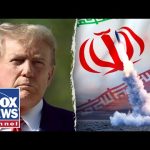On September 26, Americans took a moment to remember a tragic day from four years ago—a suicide bombing at Kabul International Airport that claimed the lives of 13 U.S. service members during the tumultuous withdrawal from Afghanistan. This solemn occasion wasn’t just marked on calendars but was also acknowledged in the Oval Office, where President Trump signed a proclamation to honor the fallen heroes along with their families. While the day was riddled with sorrow, the President reflected on the tough lessons learned, promising that such an event would not repeat itself under his watch.
As the nation paused to remember, questions lingered about the past and future of U.S. foreign policy. Pete Hegseth, a familiar voice in conservative media, announced that he would be initiating another review of the withdrawal from Afghanistan. He is determined to sift through the chaos that ensued during the exit in hopes of compiling answers by mid-next year, if not sooner. Many supporters believe this initiative represents a crucial step toward accountability in the aftermath of a strategy that many feel was poorly executed.
In a related discussion, the spotlight shifted to the ongoing war in Ukraine. Special Envoy Steve Witkoff shared some hopeful news, suggesting that major international conflicts, including those involving Russia and Ukraine, could see resolutions in the coming months. The mantra of “peace through strength” reverberated as Witkoff referenced high-stakes meetings planned this week to address the situation not just in Ukraine, but also in regions impacted by the spirit of unrest. For many conservatives, this diplomatic approach is a refreshing departure, emphasizing strength combined with dialogue.
However, despite these optimistic overtures, there were voices that cautioned against over-enthusiasm. Victoria, the former Deputy National Security Advisor, pointed out that progress in peace talks seems to have hit a snag recently. She articulated a critical view that the international chaos stems from perceived American weakness under the current administration. The challenges in Ukraine and violence in the Middle East, including the attack on Israel by Hamas, are interconnected issues that many believe arose from a lack of decisive U.S. leadership.
As the conversation turned toward North Korea, there was speculation about a possible reunion between President Trump and Kim Jong Un. While some see this reunion as a potential path to peace on the Korean Peninsula, others raise concerns about what could truly be achieved through talks. Advocates for dialogue argue there is no harm in attempting to broker peace, especially with the rising tensions brought on by nuclear threats. Interestingly, the recent collaboration between the United States and South Korea on shipbuilding projects sends a strong message to China about military readiness, signaling a proactive stance in foreign relations.
The story of the Kabul bombing remains a heavy reminder of the sacrifices the U.S. military has made. It catalyzes conversations about how to navigate international conflicts that continue to challenge not just America, but the entire world. Whether through reflections on past mistakes or an eye toward future negotiations, conservatives maintain a belief in the importance of leadership that prioritizes strength, diplomacy, and above all, the safety of American lives.




